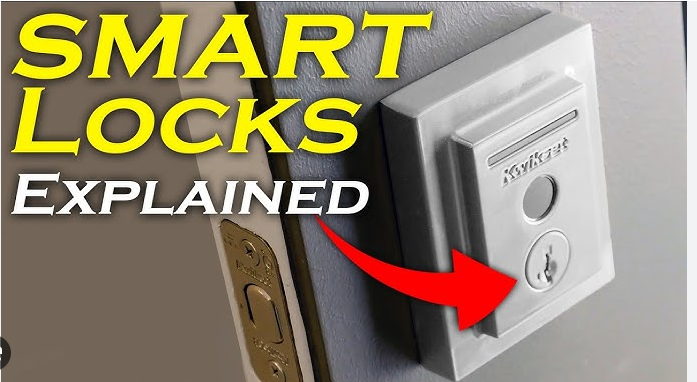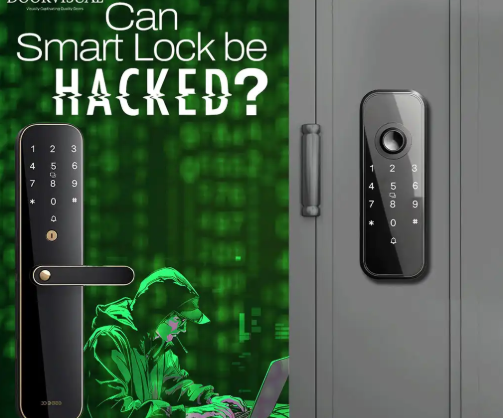As smart locks become a staple in modern home security, a common question arises: “Can smart locks be hacked?” The convenience of keyless entry, remote access, and smart home integration makes smart locks appealing, but their reliance on technology raises concerns about potential vulnerabilities. While smart locks are designed with advanced security features, no device is entirely immune to hacking. In this comprehensive guide, we’ll explore whether smart locks can be hacked, the risks involved, and how to ensure smart lock safety through proper smart lock installation, setup, and maintenance. By following best practices and choosing a reliable model, you can minimize risks and enjoy the benefits of a smart lock.
How Do Smart Locks Work?
To understand whether smart locks can be hacked, it’s helpful to know how they function. Unlike traditional locks that rely on a physical key, smart locks use technologies like Wi-Fi, Bluetooth, or Z-Wave to enable keyless entry. You can unlock your door using a smartphone app, a PIN code, voice commands via a smart assistant, or biometric features like fingerprint scanning. Many models also allow remote access, letting you control your lock from anywhere with an internet connection.
These features make smart locks convenient, but their connectivity introduces potential entry points for hackers. To answer “Can smart locks be hacked?”, we need to examine their security features, vulnerabilities, and how to mitigate risks through proper smart lock setup and maintenance.

Can Smart Locks Be Hacked? Assessing the Risks
The short answer is yes, smart locks can be hacked—but it’s not as simple as it sounds. High-quality smart locks are designed with robust security measures to make hacking extremely difficult. However, like any connected device, they’re not 100% immune to vulnerabilities. Let’s explore the main risks and how they can be addressed:
- Wi-Fi and Bluetooth Vulnerabilities: Smart locks that connect via Wi-Fi or Bluetooth could be targeted by hackers attempting to intercept signals. However, reputable models use advanced encryption (e.g., AES-128 or AES-256) to secure communications, making interception highly unlikely.
- Weak Passwords: If you use a weak or reused password for your smart lock app or associated accounts, hackers could gain access through brute-force attacks or credential theft. Using strong, unique passwords and enabling two-factor authentication (2FA) significantly reduces this risk.
- Firmware Exploits: Outdated firmware can contain vulnerabilities that hackers might exploit. Regular updates during smart lock maintenance ensure your lock stays protected against known threats.
- Physical Tampering: While not technically hacking, some intruders may attempt to physically bypass the lock. High-quality smart locks are built with tamper-resistant materials and designs to prevent this.
- Malware or Phishing Attacks: Hackers could target your smartphone or smart home hub with malware or phishing scams to gain access to your lock’s controls. Securing your devices with antivirus software and avoiding suspicious links helps mitigate this risk.
While these risks exist, they’re often overstated. With proper precautions, the likelihood of a smart lock being hacked is low, especially when compared to the vulnerabilities of traditional locks, such as lock-picking or key duplication.
Security Features That Protect Smart Locks from Hacking
Reputable smart locks are equipped with advanced security features to minimize hacking risks. When choosing a lock, refer to a trusted best smart lock guide to identify models with robust protections. Here are key features that enhance smart lock safety:
- Advanced Encryption: High-quality smart locks use military-grade encryption (e.g., AES-128 or AES-256) to secure data transmitted during remote access or when you connect a smart lock to your network.
- Two-Factor Authentication (2FA): 2FA requires a second form of verification, such as a PIN or biometric scan, making it harder for hackers to access your lock even if they obtain your password.
- Secure Pairing Protocols: When learning how to pair a smart lock, you’ll notice that reputable models use secure pairing methods to prevent unauthorized devices from connecting.
- Activity Logs: Many smart locks provide real-time logs of who accesses your door and when, allowing you to detect suspicious activity immediately.
- Tamper Alarms: Some models include sensors that trigger an alarm if someone attempts to tamper with the lock, deterring physical attacks.
- Auto-Lock and Geofencing: Features like auto-lock and geofencing ensure your door locks automatically, reducing the risk of unauthorized entry due to user error.
These features make it extremely difficult for hackers to compromise a well-designed smart lock, especially when combined with proper setup and maintenance.
How to Prevent Smart Locks from Being Hacked
To ensure your smart lock remains secure, follow these best practices for smart lock installation, setup, and maintenance. These smart lock tips will help you minimize hacking risks and keep your home safe:
1. Choose a High-Quality Smart Lock
Not all smart locks offer the same level of security. Select a model from a reputable brand with strong encryption, regular firmware updates, and positive reviews. A comprehensive smart lock guide can help you compare models and choose one that prioritizes smart lock safety.
2. Secure Your Smart Lock Installation
Proper smart lock installation is crucial for both security and functionality. Follow the manufacturer’s instructions carefully to ensure the lock is properly aligned and securely fastened. Test the lock after installation to confirm it operates smoothly. If you’re unsure, consider hiring a professional to avoid errors that could weaken security.
3. Optimize Your Smart Lock Setup
When setting up your smart lock, take these steps to enhance security:
- Use a strong, unique password for the lock’s app and any associated smart home accounts.
- Enable 2FA if available to add an extra layer of protection.
- Connect your smart lock to a secure Wi-Fi network with WPA3 encryption, and avoid using public Wi-Fi for remote access.
- Pair your lock securely by following the manufacturer’s instructions for how to pair a smart lock.
A secure smart lock setup ensures your lock communicates safely with your devices and minimizes vulnerabilities.
4. Maintain Your Smart Lock Regularly
Regular smart lock maintenance is essential to keep your lock secure. Check the smart lock battery life every few months and replace batteries promptly when low—most models provide app notifications to alert you. Keep the lock’s firmware updated to patch any security vulnerabilities and ensure optimal performance.
5. Address Issues with Smart Lock Troubleshooting
If you experience issues like connectivity problems or unresponsive controls, refer to the manufacturer’s smart lock troubleshooting guide. Common fixes include resetting the lock, re-pairing it with your smartphone, or checking your Wi-Fi connection. Prompt troubleshooting prevents potential security gaps.
6. Consider a Portable Smart Lock for Temporary Use
For renters or travelers, a portable smart lock can provide secure, temporary access without permanent installation. Ensure the portable lock has strong encryption and reliable battery life to maintain security.

Are Smart Locks Safer Than Traditional Locks?
While the question “Can smart locks be hacked?” focuses on digital vulnerabilities, it’s worth comparing smart locks to traditional locks. Traditional locks are susceptible to physical attacks like lock-picking, bump keys, or key duplication, which skilled intruders can exploit. Smart locks, when properly secured, offer advantages like encryption, activity logs, and remote monitoring, which traditional locks lack.
However, smart locks require proactive maintenance, such as monitoring smart lock battery life and updating firmware. By choosing a high-quality smart lock and following best practices for smart lock installation and setup, you can achieve a level of security that rivals or exceeds traditional locks.
Common Myths About Smart Lock Hacking
Several myths about smart lock security can create unnecessary fear. Let’s debunk a few:
- Myth: Smart locks are easily hacked. While no device is immune to hacking, reputable smart locks with strong encryption and 2FA are extremely difficult to compromise.
- Myth: A dead battery means you’re locked out. Most smart locks include a physical key as a backup and provide low-battery alerts to prevent lockouts.
- Myth: Smart locks are too complex to secure. Modern smart locks are user-friendly, with intuitive apps and clear instructions for how to pair a smart lock and maintain it.
By choosing a reliable model and following proper smart lock tips, you can dispel these myths and enjoy a secure smart lock experience.
Smart Lock Safety for Different Scenarios
Smart locks are versatile and can be used in various contexts, each with unique security considerations:
- Homeowners: Choose a smart lock with advanced encryption and integrate it with a smart home system for enhanced control and monitoring.
- Renters: A portable smart lock is ideal for non-invasive, secure access that can be easily removed.
- Vacation Rentals: Smart locks allow hosts to grant temporary access codes to guests and monitor activity remotely, enhancing security.
- Businesses: Commercial-grade smart locks offer user management and audit trails for secure access control in offices or small businesses.
Regardless of the scenario, securing your Wi-Fi network and enabling 2FA are key to preventing hacking.
Conclusion: Can Smart Locks Be Hacked?
So, can smart locks be hacked? While it’s theoretically possible, the risk is low when you choose a high-quality smart lock and follow best practices for smart lock installation, smart lock setup, and smart lock maintenance. Features like advanced encryption, 2FA, and tamper-resistant designs make modern smart locks highly secure, often surpassing the safety of traditional locks. By staying proactive with smart lock troubleshooting and keeping your lock’s firmware updated, you can minimize vulnerabilities and enjoy the convenience of a smart lock with confidence.
For more guidance on choosing a secure smart lock, explore this comprehensive home security tips guide to find the best model for your needs. With the right precautions, a smart lock can be a safe, reliable, and modern solution for protecting your home.